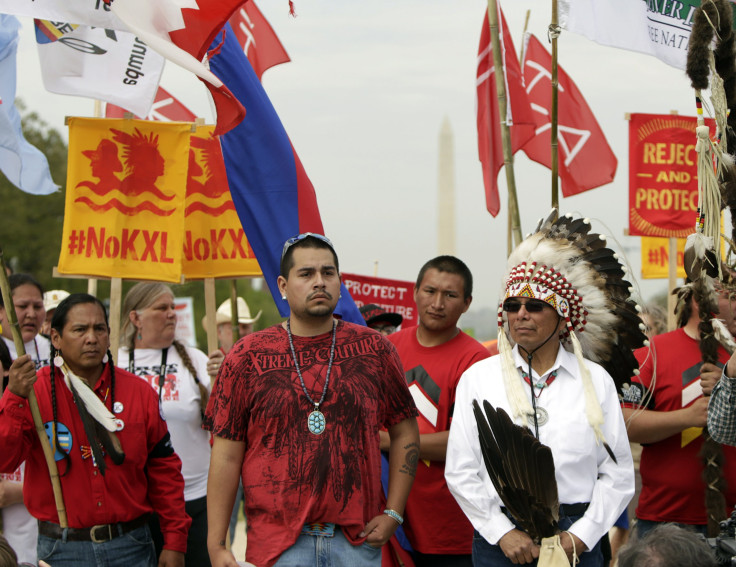Musicians Willie Nelson, Neil Young Headline Anti-Keystone XL Pipeline Concert On Nebraska Farm

Musicians Willie Nelson and Neil Young took the stage at an anti-Keystone XL pipeline protest over the weekend. From a rye field in Neligh, Nebraska, the duo played to a crowd of about 8,000 activists who claim that the proposed Canada-to-Texas pipeline would tarnish the environment and exacerbate global climate change.
The “Harvest the Hope” event on Sept. 27 came just days after environmentalists claimed victory over a stalled Canadian tar sands project. Norwegian oil giant Statoil said last week that it has shelved a multibillion-dollar development in the Alberta province because of a lack of pipeline infrastructure that could carry its oil to market.
“We’re really just a skirmish on the ground around a disaster that is waiting to happen,” Young, a Canadian singer-songwriter, said in a press conference before the concert, the Lincoln Journal Star noted. “We’re proud to be here with all of you, whether you agree with us or disagree with us, to have a discourse about what this is.”
The proposed 1,179-mile Keystone XL would run from Alberta through Montana, South Dakota and Nebraska. At Steele City, the pipeline would connect with an existing southern extension that reaches refineries in the Texas Gulf Coast. When completed, the $5.3 billion project would carry up to 830,000 barrels of heavy Canadian crude oil per day.
Nebraska has become a major battleground for the Keystone XL in recent years. About 100 landowners there have refused to sign easement agreements with TransCanada, the pipeline’s builder, over concerns that the conduit could harm their properties or spill oil into the Ogallala Aquifer, which provides freshwater for farmers and residents across the Great Plains region.
Three landowners are suing the state, and their case has wended its way into the Nebraska Supreme Court, where judges are deciding whether the 300-mile route through Nebraska is valid. The court is expected to issue a verdict early next year. The outcome could influence the Obama administration’s decision to issue or withhold a cross-border pipeline permit.
The Saturday concert raised at least $385,000 from ticket sales to help support ongoing protest efforts by activists groups including Bold Nebraska, the Indigenous Environmental Network and the Cowboy and Indian Alliance, the Journal Star reported. The Natural Resources Defense Council, a prominent U.S. environmental group, sponsored the event.
TransCanada spokesman Mark Cooper told the Journal Star that delaying the pipeline’s construction will increase the volumes of oil shipped via railroads, which will hinder the transportation of farmers’ harvests. U.S. farmers said in August that their grain shipments are already being held up by oil-carrying railcars, leading to millions of dollars in agricultural losses and slower production for major food companies such asGeneral Mills.
“Delaying the Keystone XL means encouraging the loss of good jobs for Nebraskans and more than $20 million a year in annual property taxes to counties for schools, roads and other infrastructure once the Keystone XL is at full capacity,” Cooper told the Lincoln newspaper.
© Copyright IBTimes 2024. All rights reserved.











